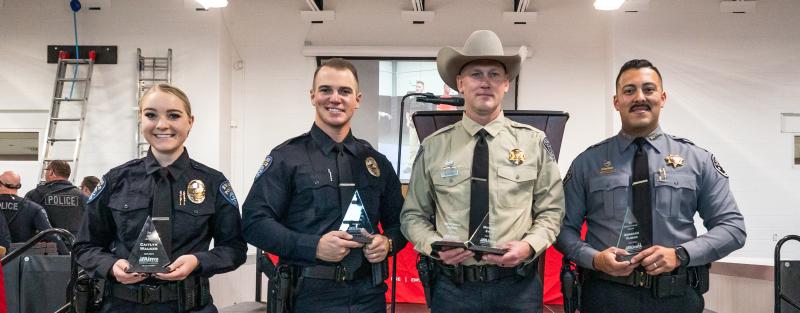Enrollment in the Aims Police Studies A.A.S. degree program is subject to approval at the discretion of the Aims Peace Officer Academy Director.

Next Steps
This program has a multi-step application process.
Do you have questions?
Degree at a Glance
Degree Type
Associate of Applied ScienceLocation
Credits
62Tuition*
*Check Cashier’s Office for current tuition rates and lab/course fees and your program for any additional costs.
Related Links
Police Studies
Related Resources
Police Studies
Police Studies
Police Studies Selective Enrollment
If you've completed a Peace Officer Academy or plan to attend as a sponsored cadet, the Police Studies Associate of Applied Science (A.A.S.) is a natural next step. Designed as an academic extension of the Peace Officer Academy Certificate, this law enforcement associate degree builds on the state-mandated Colorado Peace Officer Standards and Training (POST) curriculum. In this program, you'll gain additional coursework in criminal justice, leadership and communication to support long-term success in the law enforcement profession.
The Aims Police Studies program reinforces the professional and ethical standards required in law enforcement, while providing a deeper understanding of policing in today’s communities. With a focus on real-world application and continued skill development, the program prepares you for advancement and leadership in the field.
Between 2018 and 2020, an average of 94.95% Aims students passed the POST exam on the first try. On subsequent attempts 100% passed the exam, demonstrating the strength of the academy foundation that carries into this degree.
Please note: The Aims Peace Officer Academy is a full-time, one-semester program that is only available to sponsored cadets.
After earning an A.A.S. in Police Studies, you can transfer seamlessly to CSU Global to pursue a bachelor’s or master’s in criminal justice. If you have an interest in public safety leadership, after earning your associate degree you can also apply to the Aims Public Safety Bachelor's Degree program.
If you value integrity, service and professional growth, the Aims police degree allows you to deepen your law enforcement training and broaden your career potential.
Donna Norwood (retired) shares how the Aims law enforcement associate degree program prepares you for the challenges and rewards of a career as a police officer.
The Aims police officer degree program goes beyond POST-required competencies by expanding on topics like leadership, communication, ethics and the social impact of policing. You'll gain a broader, real-world perspective that supports growth in law enforcement or public safety roles.
In addition to your academy skills, you'll study topics such as:
- Effective communication
- Criminal justice system structure
- Legal principles and investigations
- Report writing
- Leadership and supervision in public safety
- Public safety ethics and community engagement
This combination of hands-on training and academic depth prepares you not just for entry-level work, but long-term career development and advancement opportunities.
If you want the training and knowledge to become a police officer and handle the unique challenges of this career, the Aims law enforcement associate degree program can help you. In addition to receiving training to prepare for the POST certification exam, you’ll learn vital job skills, including effective communication, remaining calm under stressful circumstances and teamwork.
As part of your degree program, your instructors and advisors can help you prepare a resume and learn interviewing skills. Aims job fairs give you opportunities to practice these career skills with law enforcement recruiters from local municipalities and agencies. Adjunct instructors who work in law enforcement and guest speakers invited to attend your classes will allow you to ask questions about what departments are seeking from recruits.
As part of the Police Studies associate degree, you’ll have direct opportunities to engage with law enforcement professionals and prepare for a successful job search. Aims offers career development support including résumé building, interview preparation and networking with local agencies.
You’ll meet adjunct instructors and guest speakers actively working in the field, giving you insight into current hiring needs and expectations. Job fairs and classroom visits also give you the chance to connect with recruiters and explore career paths in law enforcement.
Note that some of the roles listed below may require further education, including a bachelor's or higher degree.
Police Studies Faculty and Staff
Learn from instructors with experience in law enforcement, including adjunct professors who currently work as police officers. Your instructors can bring their expertise into the classroom and teach you how things work in the field. You’ll also get insight into what knowledge and skills departments are seeking from potential hires.


